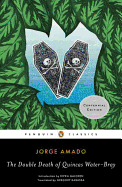
| Publisher: | Penguin | |
| Genre: | Humorous, Fiction, Classics | |
| ISBN: | 9780143106364 | |
| Pub Date: | August 2012 | |
| Price: | $14 |
| Starred | Fiction |
by Jorge Amado, trans. by Gregory Rabassa
How can a man die more than once? In Gregory Rabassa's new translation of the short comic masterpiece The Double Death of Quincas Water-Bray, beloved Brazilian novelist Jorge Amado shows how.
The notorious scalawag Quincas Water-Bray was once an exemplary employee of the State Bureau of Revenue, but since retiring 10 years ago, though, he's been a shameless drunkard and gambler--the most thoroughgoing vagabond in Bahia. He dies with a smile of mockery on his face--and well he might, since his death is about to launch a party, a brawl and a sea catastrophe. To his family, he's an embarrassment, but to his friends, the people of the street, the loss of Quincas is a blow.
When his fickle family members go home to get some sleep, they entrust Quincas's body to his drinking buddies, who decide to honor their departed friend with a more appropriate send-off. No food? No flowers? No booze? They're quick to correct the situation--and then some.
As one darkly hilarious sequence escalates into another and yet another, upping the stakes deliriously, the drunk friends decide to take their dead buddy out for one last night on the town beneath the magic Bahia moon. It's a romp at the expense of death, but Amado never trivializes mortality even while delighting in the shenanigans of his colorful cast of lowlifes. With brilliant sleight of hand and deceptive simplicity, Amado's defiance of death in this frothy, heartfelt tale reveals the Brazilian master at his earthy, big-hearted best. --Nick DiMartino, Nick's Picks, University Book Store, Seattle

| Publisher: | Penguin | |
| Genre: | Humorous, Fiction, Classics | |
| ISBN: | 9780143106982 | |
| Pub Date: | August 2012 | |
| Price: | $14 |
| Fiction |
by Jorge Amado, trans. by Gregory Rabassa
A new English-language translation by Gregory Rabassa of the delightfully titled novella The Discovery of America by the Turks by beloved Brazilian novelist Jorge Amado is cause for rejoicing.
In 1903, Jamil, a young Syrian in his 20s, and Raduan, an older Lebanese man, forge a friendship like brothers, braving the long journey to South America together. Jamil settles in a Brazilian village amid the plantations; Raduan, a charmer in his 50s, in the bigger city nearby, which Jamil visits monthly.
Raduan's old backgammon friend, Ibrahim Jafet, needs help. His wife, who used to run their prosperous dry-goods business, has unexpectedly died and his eldest daughter, Adma, has turned into a frustrated virgin spinster who rules his house with an iron fist. At first, Raduan sets up an ambitious, opportunistic young waiter to marry Adma and run the struggling shop. It sounds like the perfect plan. But then Jamil arrives in town, and Raduan--a gambler who loves "the game of destiny... in which the cards are human beings and the bets are for life itself"--realizes that whoever marries the virtuous but tyrannical Adma will have all his financial problems solved.
Amado's irresistible human palette, like Brazil itself, contains every color, race and ethnicity, from ultra-rich plantation owners to the wretches who labor in the fields. Even in a work as short and condensed as this, there are more than 40 named characters, most of whom Amado brings to life with just a few short strokes. The ending is delightful, unexpected and thoroughly satisfying. --Nick DiMartino, Nick's Picks, University Book Store, Seattle

| Publisher: | Soho | |
| Genre: | Fiction, Contemporary Women, Literary | |
| ISBN: | 9781616951467 | |
| Pub Date: | August 2012 | |
| Price: | $15 |
| Fiction |
by Paula Bomer
Early in Paula Bomer's riveting Nine Months, nauseated Sonia, pregnant with a third (unplanned) baby, is hauling her two toddlers to the butcher on one of Brooklyn's muggiest summer days. She loses it, plopping herself down in the street and shrieking at passerby. It's a striking scene.
"Why, why must I be doing this?" Sonia fumes in frustration at her child-rearing duties. "Why can't I just do nothing?" It's perverse and horrifying--yet it smacks of truth. Bomer (Baby & Other Stories) encapsulates the struggle of modern-day moms who want desperately to have kids while resenting the mindless drudgery that comes from taking care of them. Her dark parody indulges an escape fantasy every mother has but few talk about.
Sonia drains the family's joint bank account and drives cross-country, having random sexual encounters, scarfing down fast food and staying in cheap hotels. In her quest for self-discovery, Sonia revisits her estranged sister and the art professor she slept with in college, while spending no time feeling guilty about leaving her husband and children behind. It's "me time" taken to the extreme--quite frankly, the kind of freedom about which many mothers dream--and it's a stunning thing to behold. Call Sonia's tale a push-back against helicopter parents, call her a rebel, but don't call her a bad mother. --Natalie Papailiou, author of blog MILF: Mother I'd Like to Friend
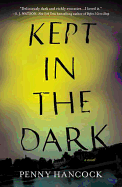
| Publisher: | Plume | |
| Genre: | Fiction, Psychological, Thrillers | |
| ISBN: | 9780452298330 | |
| Pub Date: | August 2012 | |
| Price: | $15 |
| Fiction |
by Penny Hancock
Sonia is slowly withdrawing from the world, from her marriage to an older man who travels a great deal, from her relationship with a daughter who has left home, and into the River House, her family estate on the Thames. When 15-year-old Jez knocks on her door, she is charmed by his youth, which reminds her of another time in her own life and another young boy. The pull of the river and her memories prove too strong for her, and Sonia decides to keep Jez in the River House, where she feels he belongs. As the outside world mounts a search for the missing boy, Sonia becomes convinced of the rightness of what she is doing, and her fractured grasp on reality slides further downhill.
In Kept in the Dark, Penny Hancock's twist on the timeworn male kidnapper and young female victim, Sonia and her delusions are deliciously, convincingly creepy. The fantasy of her relationship with Jez, who is increasingly frightened and ill, gradually reshapes the rest of the world into the enemy of Sonia's happiness, until her connection with her own past overrules the present. The reader's willpower is tested as the stakes grow higher, along with the temptation to flip to the final page of the book. Will Sonia let Jez go as promised? Or will the force of the river, the River House and the power of obsession keep him captive? Jez's fate and the dark secret of Sonia's childhood are left hovering, teasing, until the closing moments of this delightful debut novel. --Julia Jenkins, librarian and blogger at Pages of Julia

| Publisher: | Harlequin Mira | |
| Genre: | Fiction, Romance, Contemporary | |
| ISBN: | 9780778313847 | |
| Pub Date: | August 2012 | |
| Price: | $24.95 |
| Fiction |
by Susan Wiggs
Love and longing are at the heart of Return to Willow Lake, the ninth installment in Susan Wigg's Lakeshore Chronicles series. This time, the main character is Sonnet Romano, a bright, biracial overachiever who appears to have everything going for her. She is the director of UNESCO, has been awarded a prestigious fellowship which would send her to work overseas and has the ideal beau--a West Point graduate who runs her father's high-stakes Congressional campaign.
When Sonnet leaves Manhattan to attend a family wedding in her old hometown of Avalon, on the shores of Willow Lakes in the Catskill Mountains in New York State, her "perfect" life is suddenly called into question. She bumps into Zach Alger, a childhood friend who once had "goofy ears and braces on his teeth," now charming and dashing and "as familiar as an old favorite song coming on the radio." When the two have a tryst after the wedding, Sonnet's whole world is tilted on its axis; things get even more complicated when Sonnet learns that her mother is pregnant and has also been diagnosed with cancer. This leaves Sonnet to make some very hard choices about life and love and the real meaning of family and home.
Wiggs has written another emotionally resonant, complex novel that is briskly paced and populated with fully fleshed-out characters. --Kathleen Gerard, blogger at Reading Between the Lines

| Publisher: | Minotaur | |
| Genre: | General, Police Procedural, Fiction, Mystery & Detective | |
| ISBN: | 9780312569143 | |
| Pub Date: | August 2012 | |
| Price: | $24.99 |
| Starred | Mystery & Thriller |
by Kathleen George
Kathleen George's Pittsburgh police procedurals are among the best in the genre, and Simple, sixth in the series, is no exception. A young, gorgeous paralegal named Cassie Price is murdered, and police immediately arrest Cal, a handyman helping to renovate her house. His mother happens to be the housekeeper for Cassie's boss, Mike Connolly, a charismatic man who's considering running for governor. George lets readers know up front that Cal is innocent, but neither he nor his mother may have the ability to stand up to Connolly's people, who are prepared to put their man in the governor's mansion at all costs.
One of George's signature moves is a heartbreaking central character--or characters--facing hardship after hardship yet persevering without an ounce of self-pity. Cal is that character in Simple: after a bullying incident in childhood, he incurred a serious injury that resulted in blackouts and a delay in processing certain information, which makes him vulnerable under police questioning. But his decency is obvious to readers, who will root hard for him to catch a break. (His poor hardworking mother could also use some relief from feeling she's not doing enough to protect him.)
The cops are good at their jobs, but struggle with messy personal situations. Cassie, bright and idealistic, makes unwise choices due to her naiveté. Connolly can be sleazy and have a conscience. George's characters aren't black or white, right or wrong, smart or foolish. They're complex people living in a world that's anything but simple. --Elyse Dinh-McCrilllis, freelance writer/editor, blogging at Pop Culture Nerd.
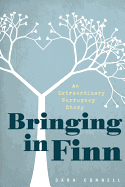
| Publisher: | Seal | |
| Genre: | Health & Fitness, Infertility, Biography & Autobiography, Pregnancy & Childbirth, Personal Memoirs | |
| ISBN: | 9781580054102 | |
| Pub Date: | August 2012 | |
| Price: | $24 |
| Biography & Memoir |
by Sara Connell
For some of us, the great desire to have children may be coupled with the disappointment of failed pregnancies and expensive but unsuccessful fertility treatments. Sara Connell and her husband, Bill, know this painful struggle well, as she recounts in the memoir Bringing in Finn.
After seeing multiple doctors, Sara and Bill are eventually referred to a reproductive endocrinologist/fertility specialist. They try several cycles of follicle stimulation without success and move on to in vitro fertilization (IVF). This does result in a pregnancy, but Sara's twin fetuses are stillborn several months before their due date. More rounds of IVF follow with no further success.
Sara, while wrestling with both the emotional and physical burdens of fertility treatments, finds new comfort in the company of her 60-year-old mother, Kristine. Then, as Sara and Bill realize they have few options left that will allow them to become biological parents, Kristine makes an extraordinary offer to act as a surrogate for her daughter and son-in-law. Connell shares the details of the implantation of a fertilized egg into Kristine's uterus, the carefully monitored pregnancy that occurs on the second implantation attempt and, ultimately, the birth of Finnean Lee Connell in 2011. This is no spoiler; how Bringing In Finn ends is of less significance than the portrait of the struggle, the hope and the love the Connell family shares over the course of this amazing story. --Roni K. Devlin, owner, Literary Life Bookstore

| Publisher: | Atria | |
| Genre: | Biography & Autobiography, Lawyers & Judges, Literary, Personal Memoirs | |
| ISBN: | 9781451661774 | |
| Pub Date: | August 2012 | |
| Price: | $25 |
| Biography & Memoir |
by Reyna Grande
Reyna Grande (Dancing with Butterflies) offers readers a glimpse into the lives of an extremely poor Mexican family in her nostalgic and brutally honest memoir, The Distance Between Us. Hoping for a better life for himself and eventually his children, Grande's father leaves two-year-old Reyna and her older siblings in Mexico to cross illegally to El Otro Lado--"the other side," the United States. A few years later, Reyna's mother also leaves, forcing the children to move in with their grandmother. Sleeping three to a bed, eating meals of beans and stolen fruit, wearing handed-down clothes and hauling buckets of water for infrequent baths are just some of the trials Reyna endures as she waits bleakly for her Mami and Papi to return. The emotional ordeal is even more severe, as Reyna endlessly questions whether her parents left her because they loved her too much or because they didn't love her enough.
After years of separation, however, Papi returns for Reyna and the others, risking their lives to take them illegally into the U.S., where life is better for the Grande family--but just barely. Grande's memoirs pulls readers into this dysfunctional family by sharing intimate details of their life on both sides of the border and in doing so makes it easier for us to understand why so many Mexicans continue to cross into the U.S. illegally to provide food, housing and education for their children. --Lee E. Cart, freelance writer and book reviewer
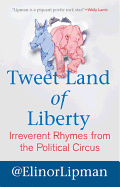
| Publisher: | Beacon | |
| Genre: | General, Limericks & Verse, Political, Humor, Form, American, Topic, Poetry | |
| ISBN: | 9780807042434 | |
| Pub Date: | August 2012 | |
| Price: | $9.95 |
| Current Events & Issues |
by Elinor Lipman
In her introduction to Tweet Land of Liberty, Elinor Lipman explains how a social networking lecture inspired her incisive collection of tweets. Encouraged by a panelist, Lipman wrote her first tweet about New York's governor signing a bill legalizing same-sex marriage. "I'm twittering!" she told her son. Rising to the challenge of creating more rhyming political observations and the lure of entertaining her "fellow political junkies" led to her pledge to tweet a new political poem every day until the 2012 presidential election.
Tweet Land of Liberty contains the early highlights, beginning with her declaration: "I'm here to parse the candidates/ And be your wingman at debates." There are tweets about early Republican candidates like Michele Bachmann and Herman Cain, as well as issues including immigration, voter ID laws and the end of the military's "don't ask don't tell" policy. Headlines provide context for many of the tweets, and spare but telling graphics dot the pages.
Not all of Lipman's tweets are humorous, but unless you're a dyed-in-the-wool Republican, you're likely to find chuckles along the way. Lipman's instinct for comic verse is truly bipartisan, rhyming "Santorum" with "adore 'em" and "Barney Frank" with "witty crank." The trick for readers will be resisting read-alouds to anyone within earshot. --Cheryl Krocker McKeon, bookseller

| Publisher: | Beacon | |
| Genre: | United States, Political Science, General, Labor & Industrial Relations, History, Political Economy | |
| ISBN: | 9780807003329 | |
| Pub Date: | August 2012 | |
| Price: | $15 |
| Current Events & Issues |
by Bill Fletcher Jr.
Unions are bankrupting the United States. They're only good for protecting workers who make trouble. They're racist, sexist organizations run by crooks--and they're totally obsolete. Right?
Wrong, says labor leader Bill Fletcher, Jr. "They're Bankrupting Us!" mixes history with political analysis and firsthand descriptions of life as a laborer to dismantle 20 separate anti-union attacks, from concerns about financial corruption to the painting of unions as a "special interest" opposed to the common good. Fletcher offers a quick yet fascinating look at union life from their foundation to the current day and traces the crucial role labor unions have played in improving human rights in the U.S. and abroad.
Although he's clearly pro-labor, Fletcher is the first to admit that a union is only as good as its dedication to its members. He's clear that not all unions have fulfilled their visions, and that corruption and discrimination can affect any organization. Nevertheless, he remains committed to the idea that labor unions, when they represent a dedicated and involved labor force, are the primary force standing up for workers against increased business demands for productivity, longer hours and reduced wages and benefits. "They're Bankrupting Us!" is a solid introduction to the idea of unions as well as a guide to improving the lives of American workers. --Dani Alexis Ryskamp, blogger at The Book Cricket
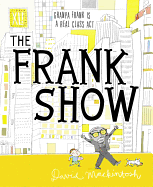
| Publisher: | Abrams | |
| Genre: | General, Juvenile Fiction, Family | |
| ISBN: | 9781419703935 | |
| Pub Date: | August 2012 | |
| Price: | $16.95 |
| Starred | Children's & Young Adult |
by David Mackintosh
When the teacher asks students to talk about a family member for show-and-tell, Grandpa Frank is the narrator's last choice. Little does he know that he and his classmates are about to be treated to an unexpected show.
David Mackintosh (Marshall Armstrong Is New to Our School) demonstrates how easy it is to take family for granted, and to assume their lives consist of only what we witness. At home, the boy tires of his grandfather's comments, such as "things were a lot tougher" when Frank was a kid. Mackintosh depicts a mauve and gray-hued collage of dinosaurs, police on horseback and gangsters. Frank eschews "fancy" food and "doesn't trust doctors as far as he can throw them," which isn't far due to an aching arm that worsens when it's about to rain. The boy's dread grows as he takes inventory of all his classmates' relatives' accomplishments. But on the day of the presentation, Frank takes over and the children are mesmerized.
Grandpa Frank appears in black and white until the day of show-and-tell, when he's dressed in full military regalia, including a red coat with epaulets (and price tag dangling). He tells how he led an army across a muddy battlefield. His arm hurts because of a piece of metal in his elbow, a souvenir of the war. Everyone has a story, Mackintosh suggests, they're just waiting to be asked. This humorous and heartwarming tale will inspire children to seek out their own grandparents' treasure trove of stories. --Jennifer M. Brown, children's editor, Shelf Awareness
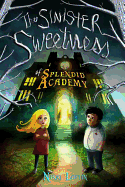
| Publisher: | Razorbill | |
| Genre: | School & Education, Fantasy & Magic, Mysteries, Espionage, & Detective Stories, Juvenile Fiction | |
| ISBN: | 9781595145086 | |
| Pub Date: | August 2012 | |
| Price: | $16.99 |
| Children's & Young Adult |
by Nikki Loftin
Young readers are sure to eat up Nikki Loftin's debut novel, The Sinister Sweetness of Splendid Academy, a feast of magic and mystery.
Lorelei, named after the spirit of German legend by her recently deceased mother, was raised on fairy tales. As a result, she believes her new "stepmonster" is a witch, unaware that trouble brews close by with someone else stirring the pot. Splendid Academy, a brick building equipped with carousels and rock-climbing walls, is built in three days. Lorelei suspects it's "too good to be true," but is nevertheless excited to attend this charter school after her own school mysteriously burns down the day after Splendid Academy's completion.
Nikki Loftin's modern retelling of Hansel and Gretel takes readers out of the woods and into Splendid Academy, where students grade themselves, have two snack times, and golden bowls of endless candy are inside their desks. But something's wrong--beyond Lorelei's rude teacher, Ms. Morrigan, with her cold "popsicle-temperature" touch. Andrew, a "really, really fat boy," who acts as the Hansel to Lorelei's Gretel, warns Lorelei about the burning hunger that seems to result from Principal Trapp's regulated feedings of Splendid's sinister sweets--and the investigations begin.
The sprinkling of Roald Dahl creepiness with peculiar, cannibalistic adult characters is the icing on a cake baked with a take-charge heroine, subtle references to the seeds of childhood obesity and lesser-known Greek mythology. This smart, enchanting book will leave readers hungry for more by this first-time author. --Adam Silvera, reviewer and former bookseller

| Publisher: | HarperTeen | |
| Genre: | Love & Romance, Fantasy & Magic, Juvenile Fiction | |
| ISBN: | 9780062003256 | |
| Pub Date: | July 2012 | |
| Price: | $17.99 |
| Children's & Young Adult |
by Jodi Lynn Anderson
Those familiar with the story of Peter Pan know he has a tantalizing past. The Disney version starts in media res and never looks back. With Wendy so newly important to Peter, Tiger Lily and Tinkerbell are relegated to secondary character status. In Tiger Lily, Jodi Lynn Anderson (Peaches) gives both Tiger Lily and "Tink" the attention they deserve, and not only broadens the Peter Pan myth, but also creates a fantastic new romance for teens.
Here, Tiger Lily is the adopted daughter of the shaman of an indigenous tribe of Neverland, at a time of uncertainty. Tinkerbell serves as faithful narrator, living her love for Peter vicariously through Tiger Lily. When they meet Peter, he and his Lost Boys represent another way of life, and soon Tiger Lily's time with him grows into a romantic bond. Adult responsibilities as well as outside forces pressure her to make a decision, but she can't seem to settle for one thing or the other.
The parallels between Tiger Lily's woes and that of modern teens will be evident to anyone who's survived a first love and first heartbreak, and especially to teenagers trying to reconcile their competing desires. Anderson also allows other story lines to shine, including a background look at colonization and the consequences of forcing a new way of life on people. The author takes on a number of mature and complex situations and handles them gracefully. Her version retains all the compulsive drama of the original, enhanced with a new compassion and heart. --Stephanie Anderson, readers' advisor at Darien Library and blogger